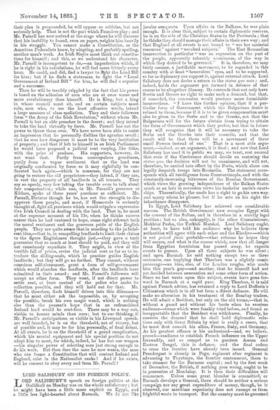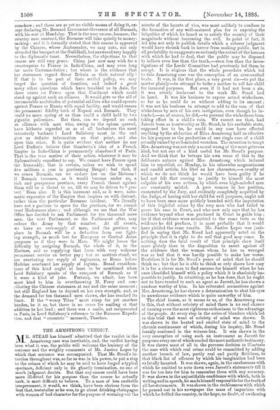j I Guildhall on Monday was on the whole satisfactory
; but he might have been a little more explicit on Egypt, and a little less light-hearted about Burmah. We do not like
jocular conquests. Upon affairs in the Balkans, he was plain enough. It is clear that, subject to certain diplomatic reserves, he is on the aide of the Christian States in the Peninsula ; that he thinks they should manage their affairs in their own way; and that England at all events is not bound to "use her material resources" against "revolted subjects." The East Rounielian insurrection in particular "was an expression on the part of the people, apparently tolerably unanimous, of the way in which they desired to be governed." It is, therefore, we may fairly assume, a justifiable movement, to be regarded in this country with at least " benevolent " eyes, and to be supported. so far as diplomacy can support it, against external attack. Lord Salisbury does not desire a return to the status quo ante ; and, indeed, holds the argument put forward in defence of that course to be altogether illusory. He contends that not only have Servia and Greece no right to make such a demand, but that, if conceded, the concession would produce more formidable
insurrections. I have this further opinion, that if a par- ticular form of Government which the Bulgarians desire is refused to them, because if it is to be given compensation must also be given to the Serbs and to the Greeks, not that the Bulgarians will for the future abstain from trying to obtain the form of Government which they prefer, but that in future they will recognise that it will be necessary to take the Serbs and the Greeks into their councils, and that the result will be that there will be a movement of three small Powers instead of one." That is a most able argu- ment,—indeed, as an argument, it is final ; and now that Lord Salisbury has used it in public we may, we trust, rest assured that even if the Conference should decide on restoring the status quo, the decision will not be unanimous, and will not, therefore, be carried into effect by the Porte, which alone can legally despatch troops into Roumelia. The statement corre- sponds with all intelligence from Constantinople, and with the constantly-increasing bitterness of the Russian Government, which views the growing independence of the Balkan States much as an heir in reversion views his bachelor uncle's court- ships. Theoretically, the uncle has a right to go his own way, and marry whom he pleases, but if he acts on his right the inheritance disappears.
In Egypt, Lord Salisbury has achieved one considerable success. The British Government now occupies Egypt with the consent of the Sultan, and is therefore in a strictly legal position ; but so also, unhappily, is the other Commissioner, Mukhtar Pasha, the Turkish Marshal. Lord Salisbury ought, at least, to have told his audience why he believes these authorities will agree with each other and the Khedive—which is not prima facie probable—what reforms he hopes they will secure, and what is the course which, now that all danger from Egyptian fanaticism has passed away, he expects events to pursue. Upon all these subjects he was silent ; and upon Burmah he said nothing except two or three sentences, one implying that Theebau was a slightly comic personage—an idea, also, of the London roughs, who made him this year's guy—and another, that he himself had not yet decided between annexation and some other form of action. Since we last wrote upon this subject, events have gone for- ward in Burmah at a rapid pace. King Theebau, it is said against French advice, has returned a reply to Lord Dafferin's Ultimatum which is in all but form a direct defiance. He will make no alteration in his treatment of the Bombay traders. He will admit a Resident, but only on the old terms,—that is, without a guard and without his boots when he receives audience—terms which were frankly tried before, and found 80 insupportable that the Resident was withdrawn. Finally, he answers the demand that he shall hold diplomatic rela- tions only with Great Britain by what is really a sneer, that he must first consult his allies, France, Italy, and Germany. As his greatest offence is his understood—and, we believe, proved—readiness to establish French influence on the Upper Irrawaddy, and so compel us to garrison Assam and Eastern Bengal, this is defiance, and the final orders to cross the frontier have already been issued. General Prendergast is already in Pegu, regiment after regiment is advancing to Thyatmyo, the frontier cantonment, there to take steamer for the Burmese capital ; and by the first week of December, the British, if nothing goes wrong, ought to be in possession of Mandalay. It is then their difficulties will commence. Unless some great blunder is committed," or Burmah develops a General, there should be neither a serious campaign nor any great expenditure of money, though, be it observed, our maritime superiority does not exempt us ffom frightful waste in transport. But the country must be governed
somehow ; and there are as yet no visible means of doing it, ex- cept declaring Mr. Bernard Lieutenant-Governor of all Burmah, with his seat at Mandalay. That is the easy course, because, the country once annexed, the Burmese will take quietly to money- making ; and it is formally stated that this course is approved by the Chinese, whose Ambassador, we may note, not only attended the banquet at the Guildhall, but answered very happily to the diplomatic toast. Nevertheless, the objections to that course are still very grave. China just now may wish for a counterpoise to France in Indo-China, and may even long for more Customs-duties ; but where is the evidence that her statesmen regard Great Britain as their natural ally ? If that is to be part of their settled policy, we may forget the question of frontiers, and indeed a great many other questions which have troubled us in Asia, for there exists no Power upon that Continent which could stand up against such an alliance. It would give us the aid of innumerable multitudes of potential soldiers who could operate against France or Russia with equal facility, and would ensure the permanent fidelity both of Nepaul and Burmah. They could no more spring at us than could a child held by two gigantic policemen. But then, can we depend on such an alliance with men who, owing to the opium quarrel, have hitherto regarded us as of all barbarians the most intrusively barbaric ? Lord Salisbury must in the end give us definite information on that point, and also upon this other. It is quite evident that neither he nor Lord Dufferin believe that Gambetta's idea of a French Empire in Indo-China is permanently abandoned at Paris. That is the true motive of their action, whatever it may be diplomatically expedient to say. We cannot have France upon the Irrawaddy, that is certain, unless we wish to spend five millions a year in garrisoning Bengal ; but then, if we annex Burmah, can we endure her on the Meinam ? If Burmah becomes, as it would become under us, a rich and prosperous province, every French threat against Siam will be a threat to us, till we may be driven to " pro- tect " Siam also. It is this incessant and, as it were, auto- matic expansion of the Empire that inspires us with distrust, rather than the particular Burmese incident. We literally have not a garrison to spare for the province, for we cannot trust Madrassees alone ; and although we see that the War Office has decided to ask Parliament for ten thousand more men, the next Parliament, or the Parliament after, may reduce the Army by that number. At all events, we have no over-supply of men, and the garrison we place in Burmah will be a deduction from our fight- ing strength, as much lost for European or Central Asian purposes as if they were in Mars. We might lessen the difficulty by assigning Burmah, the whole of it, to the Marines, and so supplying that force with very welcome peimanent service on better pay ; but as matters stand, we are overtaxing our supply of regiments, as Rome before Hadrian overtaxed her supply of legions. Broad considera- tions of this kind ought at least to be mentioned when Lord Salisbury speaks of the conquest of Burmah as if it were a kind of joke. Fortunt, we admit, has been most kind to him in overthrowing M. Ferry and con- ciliating the Chinese statesmen at one and the same moment ; but still England has to depend on her own strength, and, as the demand for ten thousand men shows, she has reached its limit. If the "weary Titan" must stoop for yet another burden, be it so, but there is no cause for smiling at that addition to her load ; and there was a smile, not reciprocated in Paris, in Lord Salisbury's reference to the Burmese Expedi- tion, and that " eccentric " monarch, Theebau.







































 Previous page
Previous page